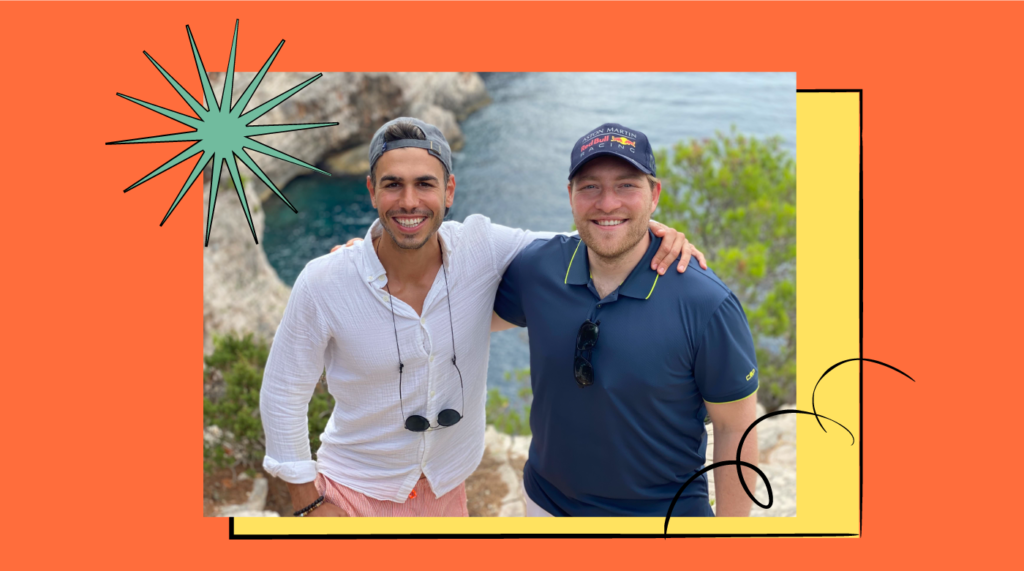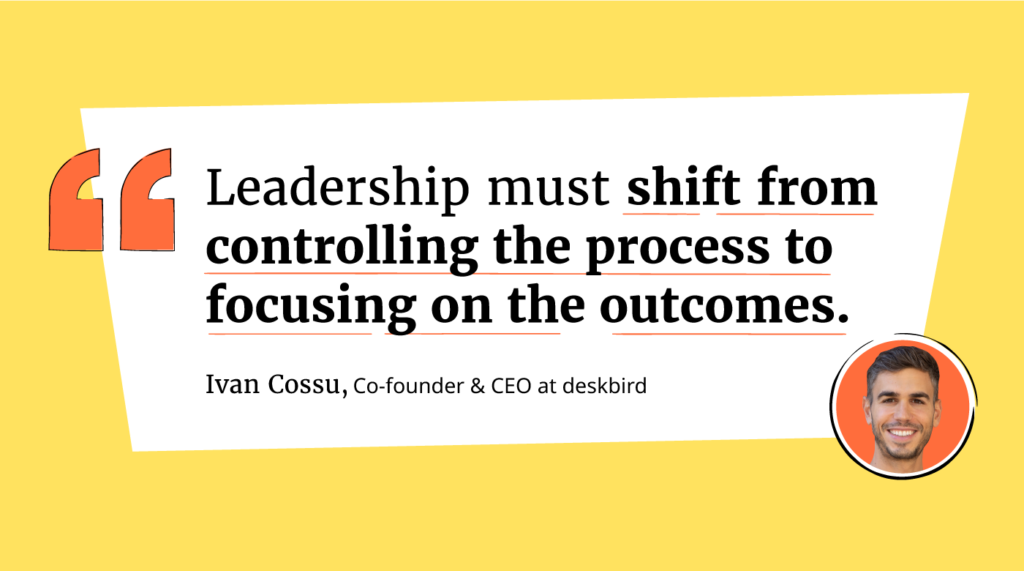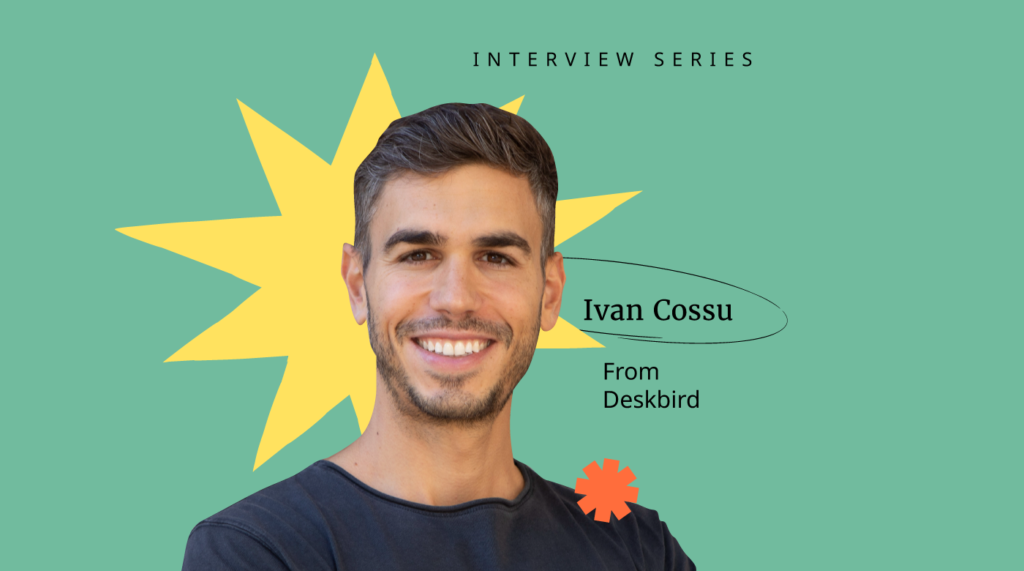We're passionate about the world of work and how we can improve it. To help satisfy our curiosity, we've launched an interview series where we pick the brains of experienced leaders, business owners, managers, and individual contributors to get their thoughts on how we can collectively build better workplaces.
We'd love to get to know you a bit better. Tell us a bit about your backstory.
My grandparents all immigrated from Italy to Switzerland, where I was born and where I grew up. So I feel half Swiss and half Italian. My career began with a very traditional path: I graduated from St. Gallen University and gained my first experiences at large companies, such as Morgan Stanley and The Boston Consulting Group (BCG).
I have felt a passion for entrepreneurship from a young age as I always got super excited about “building new things.” One of my first projects was to sell soccer shirts online through a self-developed online shop—this was more than ten years ago. I also dabbled in other projects, like organizing a hip-hop music concert for a thousand people at the age of 17.
However, all ventures have been side projects so far, without a full commitment from my side. Still, my goal was to build something significant from scratch at some point. All I was looking for was a great idea and a co-founder to make it happen. So, when we started working on deskbird, everything fell into place, and I felt I had all the ingredients to build the start-up I always wanted.
If we were to ask a friend to describe your personality to us, what would they say?
My friends and family would likely tell you that I know what I want in life and work hard to achieve it as much as possible. I'm also known for getting super excited and curious about all sorts of new things (I never get bored), and perhaps a bit tense since founding deskbird.

Thinking back to your career journey, what's an interesting story that stands out?
I would say that the change in strategy here at deskbird has been the most exciting journey.
Initially, we were a marketplace for coworking spaces, similar to an Airbnb for workspaces. The idea originated from a personal problem we as founders experienced (it was challenging to find and compare coworking spaces, and it was usually impossible to book them by the hour without a membership). As a result of our efforts, we quickly acquired the first 300 workspaces across Europe and brought them onto our platform, including big brands such as Mindspace, The Office Group (TOG), etc.
Despite our attempts, the demand for this service did not really pick up as we anticipated, and we didn't see any possibility of building a sustainable business model. So, we decided to shift our focus and start listening closely to what companies around us were struggling with.
We have always wanted to go B2B with our business model, and we were in discussions with many companies. We listened and collected their feedback and, as it turned out, the problem was not with the lack of space but rather with the management of their existing offices.
As we adjusted to our new business model, we also realized that our internal app (initially developed for B2C and optimized for conversion and user experience) would be a valuable tool for B2B companies. As a matter of fact, our partners proactively requested to use it for managing their internal spaces.
And that's how we shifted from being an "Airbnb for coworking spaces" to an "OS for flexible workspaces" and when the deskbird adventure took off.
A key strength of our software today is that it is user-centric (and not office-centric), so it delivers an unmatched user experience. In many ways, this is a (positive) legacy from our previous business model, which has now become one of our critical competitive advantages.
Of course, I learned a lot from my first steps into the start-up world. I'd say that my takeaway is that a successful start-up requires luck. And patience. Your success will take some time, but if you're patient (and persistent) enough, you'll get there.
What's the most impactful lesson you've learned over your career thus far?
Strive for excellence and never settle for less. The sky is the limit when it comes to what we can accomplish. However, you have to put all your effort into it. Start-up founders don't compromise!
Thanks for giving us some insight into who you are! Let's jump into things. When you hear the phrase "build a better world of work," what comes to mind?
In recent years, the concept of "work" has changed significantly. The physical office isn't as important anymore. Work can be done wherever you want because work isn't a place. It's an activity.
I also think it's safe to say that we won't be talking about hybrid work ten years from now, and working remotely will become the norm by default. In fact, knowledge workers won't come to the office because they need physical access to systems. In the future, coming to work will become a conscious decision, e.g., for socializing, meeting in person, or simply for a change of environment after working from home for a couple of days. Some people may spend more time at the office, while others may go completely remote. And that's ok because the real work revolution will come from being genuinely flexible.
No more geographic limitations also in the hiring process:
With a global job market at my fingertips, why should I limit myself to Zurich when I can find a senior cybersecurity manager anywhere in the world?
A profound change is also taking place in the workplace landscape: most offices are no longer dedicated to single rooms for individual work. Still, they are becoming open and flexible workplaces for collaborative and focused work.
For you, what's the main blocker you see as standing in the way of building a better world of work?
I believe a culture change is necessary to accomplish a better world of work. With more work flexibility, many leaders must learn how to manage effectively for the first time in their careers.
Giving people ad-hoc tasks and tracking how long they sit at their desks isn't enough anymore.
As a leader, you must ask yourself how a particular role contributes to the company's overall vision, the high-level KPIs your team should be held accountable for, and how to measure them. Above all, you need to learn how to guide your team so that—no matter if they are working from an office or an island in Spain—they can accomplish your vision.

It does not matter if my team members have lunch with family members in between tasks or do laundry at home while working. I'm happy if they consistently deliver the best results (in terms of outcomes) and are their best selves.
Companies that manage this transition well may improve their performance since leading by outcomes is more effective (although it is easier to lead by a process since leaders don't have to adjust to high-level KPIs).
What's one thing within our control that we can practically do to build a better world of work today? And, how do you recommend going about it?
Make remote work a priority.
Most teams would be interested in having more remote work flexibility. Nevertheless, no one is speaking up because they are afraid of the reaction of their managers.
If remote work is an option, I encourage you to ask for it proactively.
If your manager is open to a change, you're in the right place. If not, you should probably consider changing your employer and explore other options.
In five years, we will look back on companies proposing 100% office work and smile.
Can you share one thing you've experienced, seen, or read about that is leading us towards a better world of work?
In my opinion, there is no doubt that flexible work is the way to go. The question is not if anymore, but when.
If your company doesn't commit to hybrid, nobody with any talent will ever work for you again.
Gallup's report paints a clear picture: convene your board and CEO and shift to a hybrid work model. It's your most critical decision for your company, which will have tremendous implications for growth, profit, and stock price.
I'm curious, thinking about building a better world of work. Is there a company and/or leader who stands out to you as someone we should follow? If so, what are they up to?
Yes, of course! There are many thought leaders I follow and admire for the way they are contributing to the New Way of Work conversation. First of all, the founders of Airbnb since they have fully embraced the work-from-anywhere concept. Then, Professor Lynda Gratton, for her research on how to make hybrid work for everyone. And last but not least, Chris Dyer, with his work on company culture and remote leadership.
How can our readers follow your work?
I'm very active on LinkedIn, but you can also find our work on Medium.
Thank you for adding your voice to the People Managing People's interview series on How to Build a Better World of Work!
Add Your Voice To The Conversation
Join our interview series and share your ideas for how we can build a better world of work.

